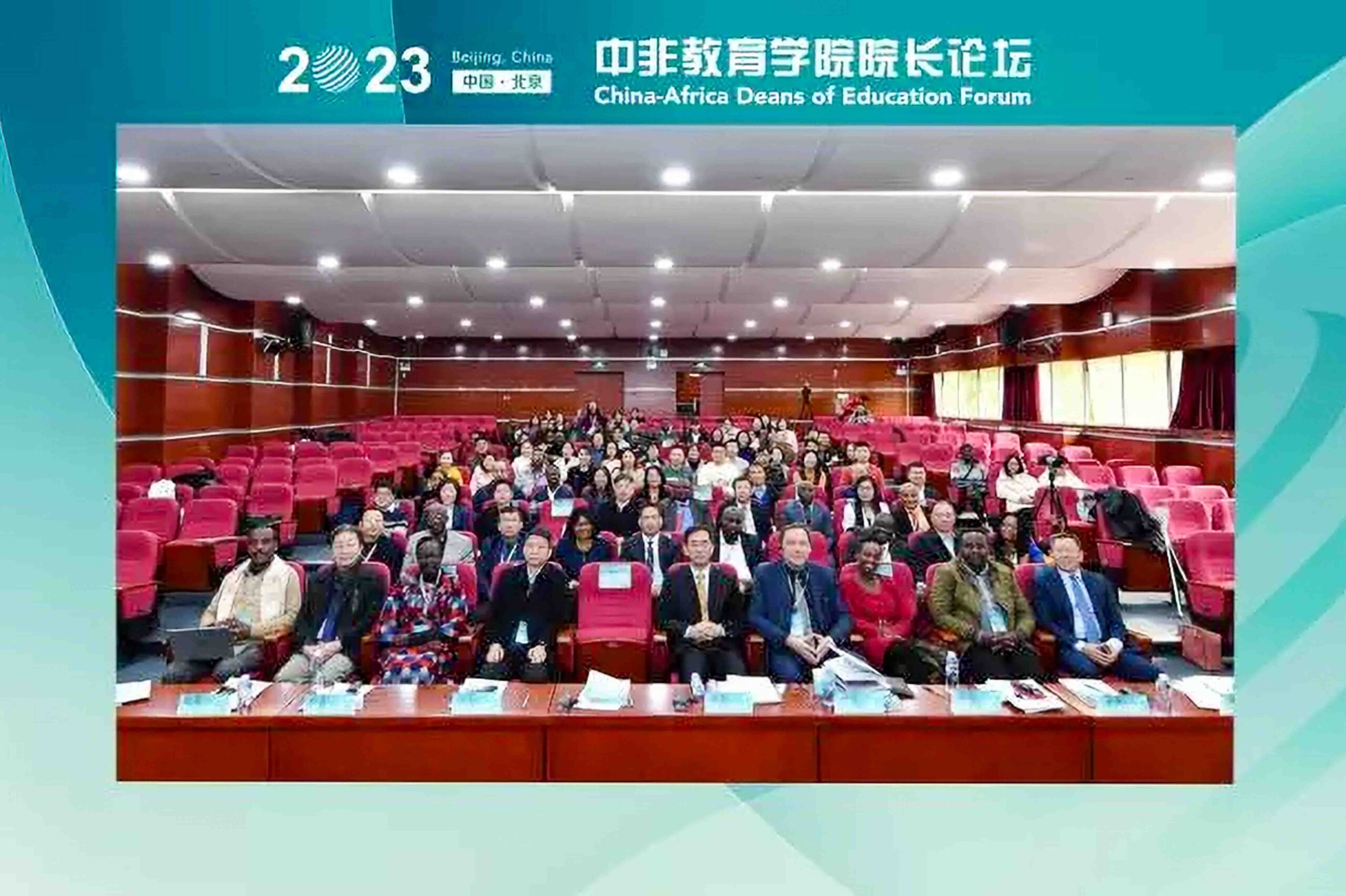
| ©BNU/UNESCO INRULED
On November 15, the China-Africa Deans of Education Forum was held in Beijing in the presence of two dozen Deans of Schools of Education from major universities in China and Africa. Hosted by Beijing Normal University (BNU), the Forum launched the China-Africa Deans of Education Network, a platform to promote south-south exchanges on education policy and teacher professional development.
The Forum was organized by the Faculty of Education of Beijing Normal University together with the UNESCO International Research and Training Centre for Rural Education and the UNESCO International Institute for Capacity Building in Africa. The China Institute of Education and Social Development of Beijing Normal University and the Chinese National Commission for UNESCO provided support. The Forum was attended by more than 200 participants in person and close to 4,000 participants online.
By inviting policymakers, researchers, and practitioners in the field of teacher education from China and Africa, the Forum, which is to be held each year, will facilitate policy dialogue, practice sharing, research cooperation, and joint action, ultimately contributing to the achievement of the SDGs. The Forum’s aims are to (1) Launch a network of Chinese and African Teacher Education Institutions, strengthen partnerships, and improve cooperation mechanisms; (2) Establish a platform to share policies, practices, and experiences in transforming education; and (3) Strengthen cooperation among various stakeholders to promote education cooperation between China and Africa and support the Education 2030 Agenda.
The African and Chinese universities that participated in the discussions were represented by the Deans of their Schools of Education. On the African side, participating universities included the University of the Gambia, the University of Science and Technology of Namibia, the University of Rwanda, the University of Zambia, the University of Calabar in Nigeria, the University of Dar es Salaam in Tanzania, the University of Addis Ababa in Ethiopia, Makerere University in Uganda, the University of Education in Winniba, Ghana, and the University of Nairobi in Kenya. The Director General from Ghana’s Institute for Educational Planning and Administration also attended. Apart from Beijing Normal University, the participating Chinese universities were Peking University, Tsinghua University, Zhejiang University, Nanjing University, Southwest University, East China Normal University, Central China Normal University, Nanjing Normal University, Shaanxi Normal University, South China Normal University, Zhejiang Normal University, and Guangxi Normal University.
Professor Xudong Zhu, Dean of the Faculty of Education of Beijing Normal University, presided over the opening session, with remarks from Ms. Sophia Ashipala (Head of Education at the African Union Commission), Dr. Quentin Wodon (Director of UNESCO IICBA), and Mr. Changwei Qin (Secretary General of the National Commission of the People’s Republic of China for UNESCO). Thereafter, Dr. Yuchi Zhao, Executive Director of UNESCO INRULED, introduced the network. Keynote addresses where then delivered by Professor Zhu and Dr. Wodon in a session moderated by Fatou Niang from the Teacher Task Force hosted by UNESCO.
The rest of the day was devoted to three panels, each with six to eight African and Chinese Deans presenting case studies and reflections by theme. The first panel was on innovating education for creative societies. Embracing technology and innovation in education is essential for achieving SDG 4 and providing quality learning opportunities for all. Particularly, it offers significant potential to create inclusive learning environments in challenging contexts such as conflict zones and remote areas. In that session, the Deans discussed topics related to innovation and technology in and through education, such as the available evidence on innovation in education, the impact of digital technologies on teaching and learning, and STEM education.
The second panel was on cultivating education for cohesive and inclusive societies. To achieve social cohesion and inclusion, it is crucial to address the education needs of vulnerable groups, including marginalized populations, minority groups, refugees, and individuals affected by conflict or living in remote areas. Education serves as both a reflection of societal cohesion and a catalyst for fostering it. The Deans exchanged experiences and insights on strengthening education for social cohesion and inclusion, sharing practices, and discussing challenges in different socio-economic contexts.
The third panel was on preparing future teachers for transformative work. The transformative work of teachers goes beyond traditional roles, shifting towards a collaborative endeavor that sparks educational and social transformation. It entails recognizing the importance of knowledge production, reflection, and research within the teaching profession. It also involves supporting the autonomy and freedom of teachers and encouraging their active participation in public dialogue on the future of education. As institutions responsible for cultivating future teachers, the Deans discussed the role Teacher Education Institutions in preparing teachers for transformative work.
The immediate next steps in the Forum will consist of preparing an edited volume of special issue of a journal with contributions from the Deans and their teams on achieving inclusive quality education for rural population and vulnerable groups, as well as an eLearning course on those topics, building on successful experiences in both Africa and China. This should prove to be a useful contribution in the context of the Ministerial Conference of the Forum on China-Africa Cooperation in 2024. More generally, the Forum and broader network will be used as a new south-south knowledge exchange platform on teacher education and professional development.
By Liu Jing, Yuchi Zhao, and Quentin Wodon. Liu Jing is Director of the Office of International Exchange and Cooperation of FOE at Beijing Normal University. Dr. Yuchi Zhao is Executive Director of UNESCO INRULED. Quentin Wodon is Director of the UNESCO International Institute for Capacity Building in Africa.
Originally posted by UNESCO IICBA. To access the original article, please click here.
